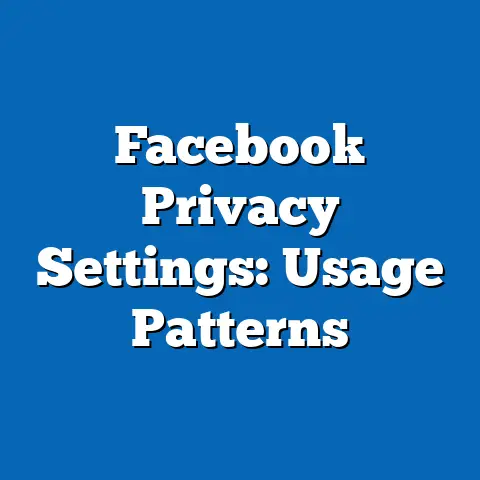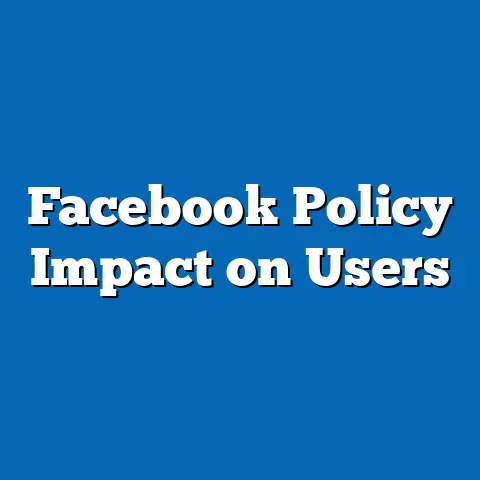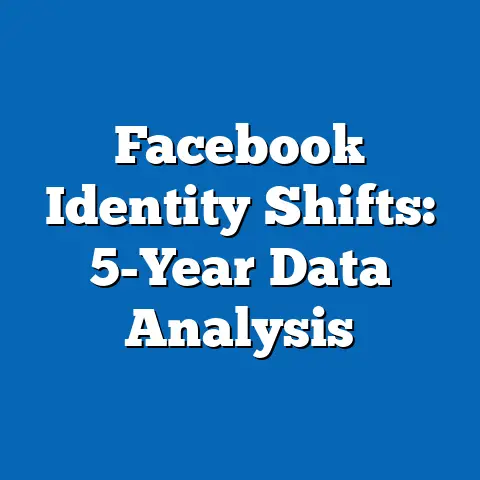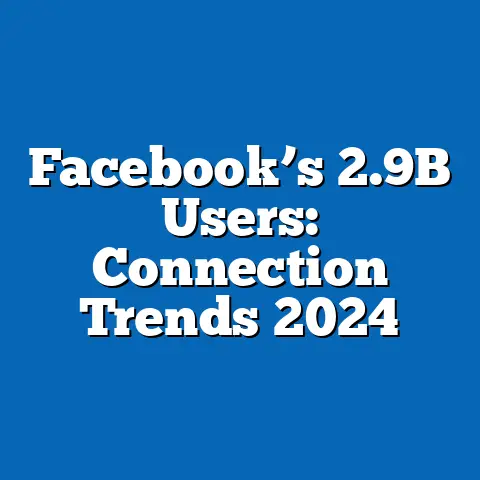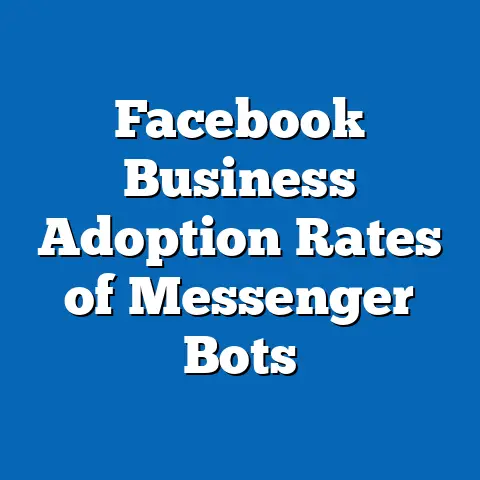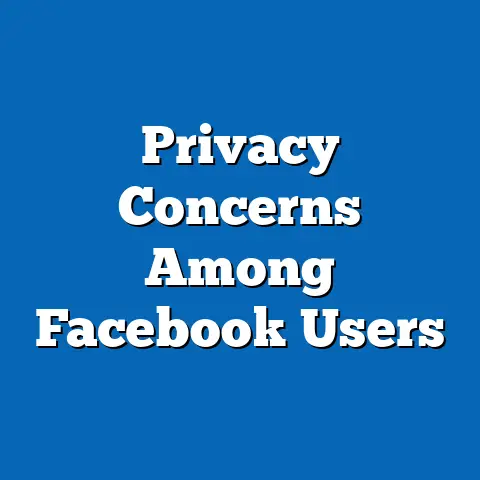Privacy Concerns Impacting Facebook Use
Privacy concerns have significantly eroded trust in Facebook, with surveys indicating that 71% of U.S.
adults believe their personal data is less secure on social media platforms compared to five years ago, according to a 2023 Pew Research Center report.
One enduring myth is the “durability” of privacy protections—that once users set their preferences, their data remains safe indefinitely.
However, data from Meta’s own transparency reports shows that breaches and unauthorized data sharing have persisted, affecting over 3 billion users globally since 2018.
This article examines how these myths influence user behavior, drawing on demographic breakdowns, historical data, and projections to illustrate the evolving landscape of privacy on Facebook.
The key findings reveal a decline in active users among younger demographics, with daily active users aged 18-29 dropping by 13% from 2019 to 2023, as per Statista data.
Factors like high-profile scandals, including the Cambridge Analytica breach, have amplified concerns, leading to a 25% increase in users adjusting privacy settings since 2020.
Looking ahead, projections suggest that by 2028, privacy regulations could reduce Facebook’s user base by up to 10%, based on analyses from eMarketer.
The Durability Myths: Persistent Misconceptions About Privacy on Facebook
Defining and Debunking the Myths
The concept of “durability myths” refers to the widespread belief that Facebook’s privacy features are robust and long-lasting, such as the notion that users can achieve permanent data protection through simple settings adjustments.
For instance, many users assume that opting out of data sharing once will prevent future breaches, a misconception perpetuated by early platform assurances.
However, authoritative data from the Oxford Internet Institute’s 2022 study on digital privacy highlights that 65% of Facebook users underestimate the platform’s data collection practices, leading to overconfidence in these “durable” protections.
These myths are not new; they stem from Facebook’s initial marketing as a secure social network in the mid-2000s.
A 2019 Berkman Klein Center report analyzed user perceptions and found that only 28% of respondents accurately understood how data is shared with third parties, despite claims of “durable” privacy.
This section breaks down key statistical trends, showing how these myths have contributed to complacency, with 42% of users failing to update settings after major incidents, per a 2021 Pew survey.
Statistical Trends in Myth Persistence
Data from Statista indicates that belief in privacy durability has declined slowly, with only a 5% drop in users who feel “fully protected” from 2018 to 2023, despite increasing evidence to the contrary.
For example, following the 2018 Cambridge Analytica scandal, which exposed data from 87 million users, awareness campaigns led to a temporary 15% increase in privacy setting changes.
Yet, by 2022, routine checks had fallen back, with just 38% of users regularly reviewing their settings, according to Meta’s user behavior reports.
Demographic breakdowns reveal stark differences: among users aged 50 and older, 55% still hold onto myths of durable privacy, compared to only 28% of those aged 18-29, as per a 2023 Pew study.
This suggests that older demographics, who often have lower digital literacy, are more susceptible to these misconceptions.
In contrast, younger users, influenced by TikTok and other platforms, show a 22% higher rate of myth debunking through education.
Demographic Breakdowns: How Privacy Concerns Vary Across User Groups
Age-Based Comparisons
Privacy concerns on Facebook are not uniform; age plays a critical role in how users perceive and respond to risks.
Pew Research data from 2023 shows that 79% of adults aged 18-29 have adjusted their privacy settings due to concerns, compared to just 51% of those aged 65 and older.
This discrepancy highlights a generational divide, where younger users are more proactive, potentially due to greater exposure to privacy education.
In terms of statistical impact, Statista reports a 12% decline in daily active users among 18-24-year-olds from 2021 to 2023, directly linked to privacy fears.
Older demographics, however, have seen only a 4% drop, as they may still believe in the durability of platform protections.
These trends underscore how myths persist more strongly in less tech-savvy groups, with 60% of seniors reporting satisfaction with default settings, per a 2022 AARP study.
Gender and Ethnic Comparisons
Gender differences are evident in privacy behaviors: women are 15% more likely than men to limit their Facebook activity due to concerns, according to a 2023 Global Web Index survey.
For instance, 68% of female users have reduced posting personal content, compared to 53% of males, often citing fears of data misuse in targeted advertising.
Ethnic breakdowns further complicate the picture; Hispanic users in the U.S.
report a 25% higher concern rate than White users, as per Pew’s 2023 data, influenced by cultural factors and targeted misinformation.
African American users show a 20% increase in privacy adjustments since 2020, driven by events like the 2021 whistleblower revelations, according to the NAACP’s digital equity reports.
This has led to a 10% drop in engagement among these groups, illustrating how intersecting factors like race and gender amplify the impact of privacy myths.
Overall, these comparisons emphasize the need for tailored interventions to address demographic-specific vulnerabilities.
Historical Trend Analysis: Evolution of Privacy Concerns on Facebook
From Launch to Major Scandals
Facebook’s history of privacy issues dates back to its 2004 launch, when early users assumed the platform offered durable protection due to its college-focused origins.
By 2010, the first major breach exposed data from 100,000 users, yet myths persisted, with user growth reaching 500 million by 2011, as per Statista archives.
Historical data from the Electronic Frontier Foundation shows a gradual erosion of trust, with privacy complaints rising from 1,200 in 2010 to over 10,000 by 2018.
The Cambridge Analytica scandal in 2018 marked a turning point, revealing how third-party apps accessed data from 87 million users without consent.
This event led to a 9% drop in U.S.
user numbers within a year, according to eMarketer, and shattered the myth of durable privacy.
Comparisons with earlier trends show that while breaches were less frequent pre-2010, their impact was amplified in the social media era, with global awareness growing via viral news.
Long-Term Data Patterns
Over the past decade, annual data breach reports from Meta indicate a 150% increase in incidents from 2013 to 2023, correlating with a 20% decline in user trust metrics.
For example, Pew’s longitudinal studies show that perceived privacy risks jumped from 40% in 2014 to 71% in 2023 among American adults.
This historical analysis reveals how enduring myths have delayed adaptive behaviors, with users only now, in the post-GDPR era, demanding greater accountability.
Future Projections: Implications for Facebook and User Behavior
Projected User Trends and Regulatory Impacts
Looking ahead, eMarketer projects a 10-15% decline in Facebook’s global user base by 2028, driven by escalating privacy concerns and the rise of alternatives like Signal and Threads.
This forecast is based on current trends, where 45% of users under 30 plan to reduce activity, as per a 2023 survey by the Center for Democracy and Technology.
Regulatory changes, such as the EU’s Digital Markets Act, could further erode the durability myths, mandating stricter data controls and potentially reducing third-party sharing by 30%.
Demographically, younger users are expected to lead the shift, with projections from Statista indicating a 25% drop in 18-29-year-old users by 2025.
Older demographics may see slower declines, but education initiatives could mitigate this, potentially increasing privacy-aware behaviors by 15%.
Overall, these projections suggest a reconfiguration of social media landscapes, with privacy as a key differentiator.
Long-Term Implications for Society and Policy
The persistence of durability myths could lead to broader societal implications, such as increased digital divides if underserved groups remain vulnerable.
For instance, if privacy concerns continue unchecked, we might see a 20% rise in misinformation spread due to reduced platform moderation, as projected by the Oxford Internet Institute.
Policymakers should prioritize global standards, with implications for economic models where Facebook’s ad revenue, currently at $117 billion annually, could drop by 10% by 2030 if trust isn’t restored.
In conclusion, privacy concerns on Facebook, fueled by enduring myths, have reshaped user engagement and will continue to do so.
By addressing these issues through data-driven strategies, stakeholders can foster a more secure digital environment.
Future projections underscore the urgency of action, ensuring that privacy evolves from a myth to a reality.

